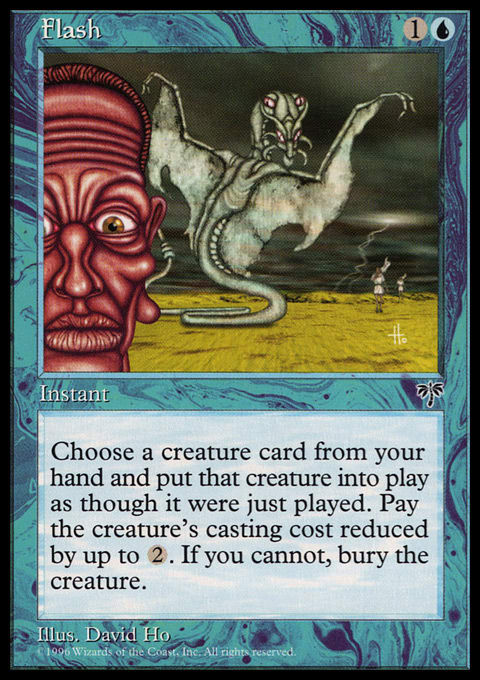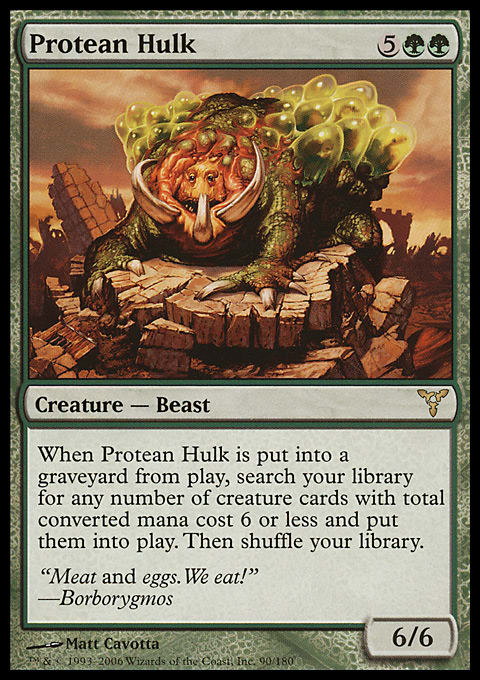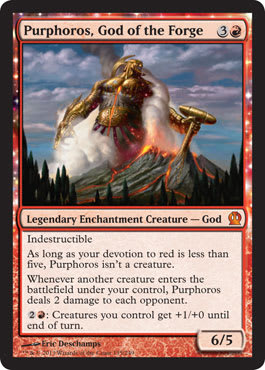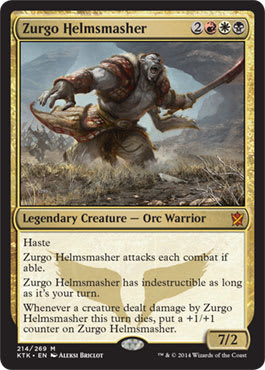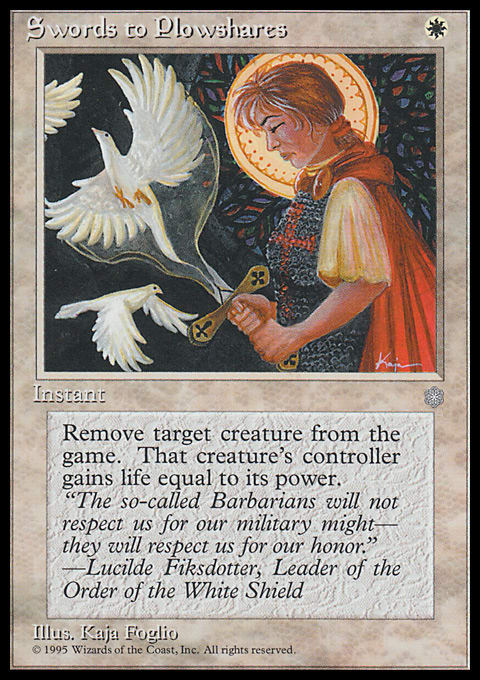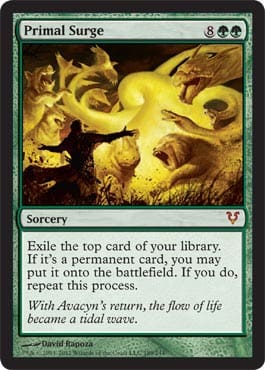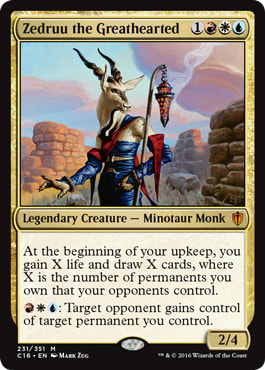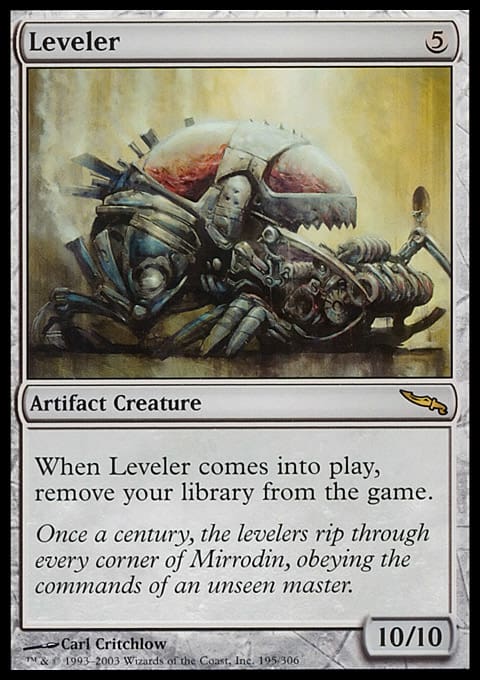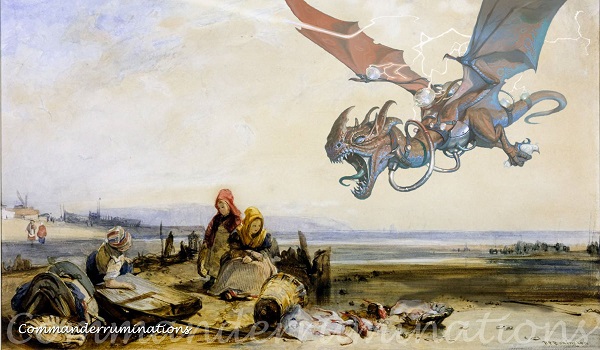
A Scene on the French Coast by Richard Parkes Bonington (1825).
Crackling Drake by Victor Adame Minguez.
Today, I'm going to write about something that is near and dear to my heart - games of Commander that are so memorable that players tell stories about them weeks, months, or even years later.
We all play this format for different reasons. Some play to win. Some play as an excuse to hang out with their friends. If you play enough Commander, you find yourself with games where the plays that turned the tide of battle were so incredible, unexpected, or hilarious that you can't help but want to recount them later on. Some players are more natural storytellers than others, but sadly, not all games are worth remembering.
I was able to think of six different types of games that might wind up being the kind you'd want to recount later on. Let's take a look at what I came up with and whether there's even a way to try to get more of these types of games into your life.
God Hands
This first category is one that may apply more to competitive players than to casual players. A "God Hand" is a hand where the cards you've drawn present you with a uniquely powerful line of play.
For more competitive decks, you might just win the game within the first turn or two. The combos you're running in your deck are so efficient and well-crafted that if you start with the right combination of cards, tutors, and counterspells you can just pop off right then and there and even protect the win as you do so.
More casual players might think of a "God Hand" as a hand with the ability to get your Commander out much, much earlier than you usually do. You might be looking at a Command Tower, Sol Ring, Signet, some non-artifact ramp and a card you might want to cast the turn after your commander comes out. It usually doesn't mean an instant win, but your fast start will place you in a position to dominate the game and maybe eliminate an opponent early enough that you'll have a great chance to win the table.
Of all my decks, the one most likely to be able to pop off with a "God Hand" would be my Muldrotha, the Gravetide deck. If I started with Flash, Protean Hulk, Force of Will, Mana Crypt, a random Blue card, and the right lands in hand I could get a turn two win with protection.
I actually had a game like that once.
I was playing my old The Mimeoplasm deck just after I added Flash and Protean Hulk to it. I was playing with some friends including a player who might have been playing her first game ever. I didn't expect to even see the new cards, but I was able to land the win on turn three. I couldn't believe it.
I sheepishly explained to the new player that this was one end of the spectrum of power in the format and that I'd gladly play a more casual deck in the next game. I felt a little bad, but it wound up being more of a teaching moment than anything else. I still felt like a bit of a jerk, but it was just a casual game and I don't think anyone was that annoyed - just surprised, much as I was, to see it happen.
You're going to remember the games where you started with just the right set of cards in your hand, and you might tell folks about it later on, but these games probably aren't the ones your opponents will be telling stories about.
Most of us have been crushed at some point in time and I think it's more common to want to forget about those games than go around telling our friends about them. It's just human nature to enjoy your ups more than your downs.
So how do you try to set yourself up to have a "God Hand" game?
This may seem obvious, but without cheating you can't really control what 7 cards you randomly draw at the start of the game. You can mulligan carefully, but your draws should still be random.
What you can do is make sure you know what your deck's best possible draw would be.
I don't ever bother to do that for any of my own decks, but if this was something I wanted to be able to identify more easily, I would work on it. I'd just go through each deck, figure out what my best starting hand is, and then keep an eye out for it when I play games.
It's worth noting that back when we had "Partial Paris" mulligans, players could sculpt their starting hands and have a better chance at starting with the best possible 7 cards in hand.
If you're lucky enough to have a "God Hand" game, definitely savor the moment and make the most of it. They don't happen often.
Epic Struggles
The opposite end of the spectrum from "God Hand" games that end remarkably quickly are the Epic Struggles we see from time to time in this format.
It should be noted that few of us fondly remember long games where nobody is able to do anything, with the possible exception being Stax players. If you get locked down so that players can't play Magic and the game takes hours and hours to reach an end, folks might talk about it later on, but usually not in a positive way.
The ideal "Epic Struggle" is one in which you win, but I think it's rare for anyone to walk away from one of these games feeling like they didn't get their money's worth.
There are usually lots of twists and turns and shifts in the balance of power thoughout the game. There are close calls where someone almost gets a combo to fire, or nearly pulls an alpha strike off. There are points where everyone gangs up on the player with the best boardstate and there are points where all of the players are at a relatively even strengths.
In the Commander League that I run, we have a lot of fast decks and strong players, but we also have the occasional game that goes to our 2 hour time limit. Last winter, when Unstable cards were temporarily legal in the format, I was able to pull off a win in extra turns in a game that went to two hours. It was probably one of my favorite of these types of games.
I was playing a Rakdos deck with an Unstable legendary creature, The Big Idea, as the general. The deck was actually built around tutoring up and playing Purphoros, God of the Forge and then using The Big Idea to churn out creatures to kill the table with ETB damage triggers.
For some reason The Big Idea never really made an impact in that game, but I had managed to do some damage to the table and my opponents were all under 25 life. There had been a ton of back-and-forth power shifts and nobody had been able to win. My last attempt, playing Army of the Damned with Purphoros on the field had been countered.
We went to extra turns and I didn't have enough lands and mana rocks on the field to be able to pay the flashback cost for Army of the Damned so my opponents didn't think they were in any danger. I think I was two mana short, so even if I topdecked a land on my final (post-time-cutoff) turn they were still going to survive. What they all overlooked was my Grinning Ignus. On my turn I was able to pay a Red mana to bounce Grinning Ignus to my hand and then pay the flashback cost on Army of the Damned to create 13 Zombie tokens and kill the table!
It felt fantastic and it's a story I still enjoy recounting, but it was also a decent game for everyone. The entire table was involved in the game and the win came at the last possible moment before it would have been declared a draw.
It's rare you'll ever be able to recount the entire story of one of these Epic Struggles because the games are just too long and have too many twists and turns. You'll remember the game - especially if you win - and you'll remember how much fun it was but the details will probably get a bit fuzzy over time.
So how do you achieve these long, amazing Commander games?
Having everyone play bad decks so that games take forever isn't really the answer. It takes decks with the ability to mount serious threats to create the kinds of shifts in power I've been describing. I think you have to run answers, you have to run strong but generally fair cards, and you have to get lucky and at times, unlucky.
The key part of this puzzle is running answers. You need to be able to fog or boardwipe at the right time or bounce an alpha strike back to someone's hand. You need to be able to get through a player having a few great turns and come out the other side with enough life and resources that you can keep fighting for the win. That means stopping combos and removing key permanents when they really need to be removed.
Any game can become an Epic Struggle, even games with highly competitive players and decks. These kinds of games are probably more likely to occur when you're playing on the casual side of the Commander spectrum.
If you're lucky enough to enjoy one of these epic games and you aren't on the winning side, try to be a good loser. Give the winner a high-five and congratulate them. If you win, again I would suggest that you savor the moment. On average you might only win a quarter of your games, so to come out on top at the end of an Epic Struggle is something both to be proud of and to remember.
Train Wrecks
Another kind of story folks like to tell is the story of the train wreck.
When you think of a train wreck, you normally think of the end part, where all the train cars come off the tracks and pile up like crazy. If you've seen the 2011 movie Super 8, that's pretty much what I'm thinking of.
It's worth remembering that a key part of the train wreck is the long and fairly routine part beforehand where everything seemed to go right.
In Commander we've all had games where everything was going right and then suddenly everything went terribly, terribly wrong. The more amazingly bad things turn out, the greater the chance that someone will wind up telling a story about the game later on.
The single most important thing about this kind of story is that you DO NOT want the story to be about you and how you reacted to your own personal Commander train wreck.
For this category I've got two stories for you.
Our first story is a short one.
I wasn't in the game and I don't know what exactly happened. Our league had just started up and I had been bringing homemade cookies every week for our players. One new player, whom I wound up playing lots of games with over the next year with no real issues, brought a cake for everyone. He worked at a local supermarket in their bakery section and much to his credit, he also seemed to understand the value of charity (bringing food) in building a community (our fledgeling league).
Something happened in his first round that got this young man so incredibly tilted that he left. I don't think he even turned in his scoresheet, but that isn't the funny part. The funny part is that he took the cake. I suppose he was the one who brought it, so he was entitled to leave with it too, but it's still a story we occasionally tell to new players in our league. When you flip out and lose your temper so badly that you need to leave the premises, you "take the cake".
Everyone has bad days and this player continued to play with us many times while he still lived in the area. I'm not trying to throw him under the proverbial bus, but I do enjoy that story. The key point here is that the story wasn't about his game, it was about how he acted once he got angry or frustrated enough that he decided to leave.
My second story is about one of my own train wrecks.
I was playing Zurgo Helmsmasher and had managed to play Worldslayer, equip it and swing with it. Normally what happens next is that everyone's lands are gone and you proceed to slowly kill the table turn after turn by swinging for 7 commander damage until everyone is dead. Any permanents that get played are destroyed by the next Worldslayer trigger.
Against many decks this would work pretty well, but I happened to be at a table with my kid. She was playing Alesha, Who Smiles at Death and on her first turn after the boardwipe she was able to play a Plains and then use Swords to Plowshares on my commander!
Plains and Swords certainly aren't super rare cards so it's not like she pulled a rabbit out of a hat but I do think she wound up winning the game. She rebuilt her board faster than anyone else, as her deck had a much lower mana curve. It was a hilarious moment for me and I hope I high-fived or fist-bumped her and made damn well sure not to be a "bad loser" in a rough moment.
When you play EDH you're going to be involved in a few train wrecks over time.
How can you control whether your train wreck will be a story worth telling?
There will be games where everything seems to be going well, or even going great, and games where everything suddenly goes wrong. Even if you think you're being treated unfairly by your tablemates, if you keep your cool the story will be about the game. If you lose it, you'll make the story about you.
Don't be the story.
Don't take the cake.
Suspenseful Moments
There are moments that do not rise to the level of being a train wreck, but are still remembered and talked about long after the game is over. These are moments where unexpected things happen or for whatever reason are just incredibly funny.
These are hard to quantify but I'll again try to explain what I mean by way of example.
I briefly had a Gyrus, Waker of Corpses deck that ran Primal Surge along with Chandra's Ignition and Triumph of the Hordes as the only non-permanent spells in the deck.
I fondly remember a game with that deck where I cast Primal Surge and explained that I had no idea whether I'd be dropping a ton of permanents onto the battlefield or only a handful. I would reveal cards until I got to a non-permanent and every card revealed would go onto the battlefield.
Once I had the table's rapt attention, I began to reveal cards off the top of my deck.
Chandra's Ignition was the third card from the top.
It was an epic fail, but it was also hilarious. I had to laugh too, though I knew I was laughing at my own foolish choice to run more non-permanents than just Primal Surge.
Part of why this was a memorable play was that I was able to get the table's rapt attention. There are easy ways to do that.
Any time you play a spell like Primal Surge, Tunnel Vision, or Mirror-Mad Phantasm where you genuinely don't know how many cards you will reveal before you get to the card that will stop the process, you can get the attention of practically everyone in the room. If you're doing it right, you don't know how many you'll reveal and nobody else does either.
That creates the kind of suspenseful moment that might get remembered.
If you wind up revealing cards all the way down to the last card in your deck, that will hopefully become a huge, game winning play. With each card you reveal the tension will be greater and the moment will be bigger.
If you wind up revealing only a card or two and then you hit the target card, the fact that you could have revealed dozens and dozens of cards makes the play something of a failure. Depending upon the context, it can even be a hilarious failure, as was the case with my 3-card Primal Surge. The lesson from Train Wrecks applies here - keep your temper or you'll risk making the story about you rather than about the funny moment where your big play fizzled on you.
So how do you build decks that create these suspenseful moments that sometimes become great stories?
The answer is simple. You build decks with the kinds of cards that don't give you a guaranteed result. You put the outcome of your games partially in the hands of fate rather than in your own hands. Clearly it's impossible to build a deck that is 100% built with cards that have a "randomness" theme, and the more of those you add to your deck, the less competitive it will probably be.
Fortunately, you don't have to go into full Chaos mode as a deck-builder to add a little chaos into your games. Just adding a Possibility Storm to a Red deck will provide you with the occasional moment where you can keep anyone from being able to intentionally target anything on the board.
Some folks hate this playstyle, but there's no denying that when you try to target a key threat with a removal spell and have to roll a 20-sided die just to see if you hit the right target, you'll be creating a suspenseful moment and one that might be long remembered.
Audacious Plays
The fifty type of story, and possibly my favorite, is the story of the Audacious Play. By that I mean a play that requires so much chutzpah that when it works players will remember it forever.
These types of plays are usually game-ending but they aren't banal, tired wincons that get leaned on by more competitive decks as an efficient way to claim victory. Mikaeus, the Unhallowed and Triskelion can kill a table with the best of them, but nobody's probably going to be telling stories about your amazing win. What that means is that this category is very meta-dependent. What is unheard of in one playgroup might be tiresome in another.
With that in mind, I think I can safely say that the wincons folks remember and talk about are the ones that are rarely seen because they are both difficult and risky to actually pull off. They might even be foolish to try, but when they work they are remembered.
My favorite win from 2017 was probably a game in which I was able to steal the table's permanents with Enchanted Evening / Aura Thief and the turn after play Leveler to remove my library from the game and then target Leveler with Fractured Identity so everyone else got a Leveler. They all lost their libraries and I passed turn to see them each lose on their draw step.
My general for that game was Zedruu and shenanigans like that are why I play Commander.
Another example of this could be the player who showed up in our EDH League and on his first day won two games with Avacyn and mass land destruction. It was brutal, and to his credit he moved on to other decks but it is still remembered by everyone who was there that day.
We also once had a player show up with a "true" cEDH deck and combo off on turn three in two straight games. I was in his first round pod and his hands were literally trembling as he went for the win.
Neither of these guys ground our faces into these particular wincons for weeks or months on end, but the fact that they had the audacity to come in and play at that level for a day left us with stories worth telling. I was happy to see more aspects of our format (MLD and cEDH) make an appearance in our league but was also happy that it didn't become a commonplace thing. We're still mostly a casual Commander league and it's important to me that new and casual players don't just get crushed when they choose to play with us.
The Unexpected Comeback
I had originally started with five types of story-worthy games, but I had to add another.
Every once in a great while you have a game where you win and your chances of victory had been so remote as to make the game worth remembering.
Some of these games are competitive but many are not until the very end where you pretty much pull a rabbit out of a hat and land the win.
I had a Mayael the Anima game once where I had such a miserably bad boardstate that I almost literally did nothing for over an hour. My friends chose not to pick on me and just let me sit there. Putting me out of my misery might have been a kindness, but in the end things worked out for me.
Once I was the last opponent left I think I was able to draw into Green with Aggravated Assault already on the table and play Savage Ventmaw. My opponent wasn't able to kill me, draw removal, or kill my dragon on their turn and I swung into infinite combats on mine. Until that turn, absolutely nothing went right and I never saw a Green source of mana. It was about as miserable a game as you could possibly ask for.
The funny part is that I had been on a losing streak and had been wondering what I'd have to do to get a win.
Apparently, the answer was to have the worst game ever but hang in there and not scoop my way out of it.
When you claw your way back to a win from 1 life, or from an hour or more of having practically no boardstate and nothing go right, it can be a game worth remembering.
I don't think there's any way to generate this last kind of tale. You're just subject to the whims of fate and sometimes the pendulum swings back your way at the last possible moment.
Final Thoughts
Commander players are attracted to the format for many reasons, but I think a really common one is that really interesting things can happen in Commander games. The best, craziest, and most interesting of those boardstates, plays, and outcomes often become stories that folks tell around the game store.
The only real way to get these kinds of stories is to play, and play a lot. They will come, though it helps to keep your sense of humor about you, and to do your best to not let the salt flow too often. You want the stories to stay about the games and not become stories about you and how you reacted to things going wrong.
That's all I've got for you today.
Thanks for reading, have fun in your games and remember - don't take the cake!














